ChevelleWorld
Chevelle Series/Model
I often hear, "Is my Chevelle a Malibu?" Well, that depends. This page will explain the differences between the various series and models in the Chevrolet Chevelle lineup of cars. This explanation only applies to the 1964 through 1972 model years in general. Later years added, deleted, and changed the lineup of Chevrolets available.
Let's begin by clarifying a few terms for standardization and use the Vehicle Identification Number (VIN) as a reference source before we answer the question.
* Division - General Motors had separate divisions for Buick, Cadillac, Chevrolet, Oldsmobile, Pontiac, and GMC. Chevrolet is division #1, Pontiac is division #2, Oldsmobile is division #3, Buick is division #4, GMC is division #5, and Cadillac is division #6. This division number is the 1st digit of the VIN with the following exceptions:
1964 - the model year was the 1st digit of the VIN
1965 - the model year is the 1st digit of the VIN for Canada
only such as 513569050001
for an I6 Malibu 4-door sedan.
1966 - the model year is the 1st digit of the VIN for Canada
only such as 613617050001
for a V8 Malibu sport coupe..
* Series - Each division has its own series of cars. Chevrolet has the full size car (Impala, Caprice, Bel Air, Biscayne, etc.), Chevelle (300, 300 Deluxe, Malibu, SS 396, etc.), Camaro, Chevy II/Nova, and Corvette. Within each general series there are sub-series (for lack of a better term right now such as 300 Deluxe, Malibu, etc. in Chevelles). Each division has its entry level offering and several upscale offerings (not options, but separate series). For example, you don't make a 1964 Malibu into a Malibu SS with any option, you simply choose the Malibu SS series itself.
From this point on, only Chevrolet division and the Chevelle series are described. Depending on the model year, the series names and engine type availability changed as some series were phased in and out. Series names are listed for each year below with their GM VIN variation shown in parentheses such as (35/36) where the odd number is equipped with a 6-cylinder engine and the even number a V8 engine.
The major series designation for Chevrolet division (2nd digit of the VIN) are #1 for Chevy II/Nova, #2 for Camaro, #3 for Chevelle, #5 for Biscayne/Bel Air (full size), #6 for Impala/Caprice (full size) and #9 for Corvette. Any VIN beginning with "11" is a Chevy II/Nova, "12" a Camaro, "13" a Chevelle, "15" a full size Biscayne/Bel Air, or "16" for a full size Impala/Caprice.
Beginning in 1972, the format of the VIN was changed from a 2-digit number to a single letter for the series and sub-series. For example a "36" series Malibu was changed to the letter "D" so instead of a "136" VIN designation, the same Malibu would be "1D." It should be noted that Fisher Body continued the "136" style number on the trim tag for 1972. Fisher Body would not change the trim tag style designation until the 1973 model year.
The sub-series and engine type designation (3rd digit of the VIN, pre 1972) identify the sub-series offering and base engine type. For the Chevelle, again depending on the model year, this could be a 300, 300 Deluxe, Malibu, SS 396, etc. For Chevelles, the 3rd digit also signifies the base engine type (I6 or V8) for a given series. If the 3rd digit is an odd number (131, 133, 135, or 137), the base engine was the I6; if the 3rd digit is an even number (132, 134, 136, or 138), the base engine was a V8.
In 1972 the 3rd and 4th digits of the VIN identify the model or Body Style as indicated below.
* Model or Body Style (hereafter simply identified as the Model) - Depending on the year, the model name and availability changed as some models were phased in and out due to demand and/or progress. The specific model comprise the 4th and 5th digit of the VIN such as #11 for a 2-door sedan, #17 or #37 for a 2-door sport coupe, #27 for a 2-door coupe, #67 for a 2-door convertible, or #80 for a 2-door sedan pickup (El Camino), etc.
For 1968 & 1969 a new #27 series was designated as a coupe while the #37 series remained a sport coupe and the #11 series sedan was dropped for 1968. The #27 series still retained the "B" pillar like the earlier #11 sedan and some references may show the #27 series as sedan due to the "B" pillar but this is not the correct terminology according to Chevrolet.
* Production Year - With the exception of the 1964 Chevelles and the Canadian-built 1965 and 1966 Chevelles, the production year is the 6th character in the VIN. See individual years of 1964, 1965, and 1966 for their specific differences.
* Engine type-size - From 1964 through 1971 the base engine type (I6 vs. V8) was identified by the 3rd digits of the VIN being an odd number or an even number as described above. Beginning in 1972, not only the engine type but the engine size and carburetor type (2bbl or 4bbl with the two 350-cid V8s) was coded on the VIN as a letter in the 5th character position. Note this ONLY applies to the VIN and does not apply the Fisher Body plate on the firewall.
The following lists show the model year followed by the various series, and finally the model availability within each series. Again, the numbers refer to the VIN and NOT the Fisher Body Number plate.
1964:
(1) Series - Chevelle 300/El Camino (53/54)
(1) Model/Body Style - 2-door sedan (11), 2-door/2-seat wagon (15), 4-door/3-seat wagon, (35), 4-door sedan (69), 2-door sedan pickup (80).
Example: 45411 designates a 1964 (4) Chevelle 300 V8 (54) 2-door sedan (11).
(2) Series - Malibu/El Camino (55/56)
(2) Model/Body Style - 4-door/2 seat wagon (35), 2-door sport coupe (37), 4-door/3-seat wagon (45), convertible (67), 4-door sedan (69), 2-door sedan pickup (80).
Example: 45580 designates a 1964 (4) Malibu I6 (55), 2-door sedan pickup (80).
(3) Series - Malibu SS (57/58)
(3) Model/Body Style - 2-door sport coupe (37), convertible (67)
Example: 45867 designates a 1964 (4) Malibu SS V8 (58), convertible (67).
1965:
(1) Series - Chevelle 300 (31/32)
(1) Model/Body Style - 2-door sedan (11), 2-door/2-seat wagon (15), 4-door sedan (69)
Example: 13115 designates a Chevrolet (1) Chevelle 300 I6 (31) 2-door/2-seat wagon (15).
(2) Series - Chevelle 300 Deluxe/El Camino (Deluxe) (33/34)
(2) Model/Body Style - 2-door sedan (11), 4-door/2-seat wagon, (15), 4-door sedan (69), 2-door sedan pickup (80)
Example: 13480 designates a Chevrolet (1) Chevelle 300 Deluxe V8 (34) 2-door sedan pickup (80).
(3) Series - Malibu/El Camino (Custom) (35/36)
(3) Model/Body Style - 4-door/3-seat wagon, (35), 2-door sport coupe (37), convertible (67), 4-door sedan (69), 2-door sedan pickup (80)
Example: 13637 designates a Chevrolet (1) Malibu V8 (36) 2-door sport coupe (37).
(4) Series - Malibu SS (37/38)
(4) Model/Body Style - 2-door sport coupe (37), convertible (67)
Example: 13737 designates a Chevrolet (1) Malibu SS I6 (37) 2-door sport coupe (37).
The 6th digit is the production year (5).
Note: A Canadian-built 1965 Chevelles combined the VIN properties of the 1964 Chevelle and U.S.-built 1965 Chevelles. That is, the 1st digit is the year (5), 2nd digit is the division (1), 3rd & 4th digits are the series, and the 5th & 6th digits are the model. Example, a Canadian-built Malibu V8 convertible will have the VIN of 513667 where the U.S.-built Malibu V8 will have the VIN of 136675.
1966:
(1) Series - Chevelle 300 (31/32)
(1) Model/Body Style - 2-door sedan (11), 4-door sedan (69)
Example: 13211 designates a Chevrolet (1) Chevelle 300 V8 (32) 2-door sedan (11).
(2) Series - Chevelle 300 Deluxe/El Camino (Deluxe) (33/34)
(2) Model/Body Style - 2-door sedan (11), 4-door wagon (35), 4-door sedan (69), 2-door sedan pickup (80)
Example: 13435 designates a Chevrolet (1) Chevelle 300 Deluxe V8 (34) 4-door wagon (35).
(3) Series - Malibu/El Camino (Custom) (35/36)
(3) Model/Body Style - 2-door sport coupe (17), 4-door wagon (35), 4-door sport sedan (39), convertible (67), 4-door sedan (69), 2-door sedan pickup (80)
Example: 13617 designates a Chevrolet (1) Malibu V8 (36) 2-door sport coupe (17).
(4) Series - SS 396 (38) (Note there is no odd series, i.e., 37, as the SS 396 was only offered with a V8 engine.)
(4) Model/Body Style - 2-door sport coupe (17), convertible (67)
Example: 13817 designates a Chevrolet (1)
SS 396 (38) 2-door sport coupe (17).
The 6th digit is the production year (6).
Note: A Canadian-built 1966 Chevelle VIN is the same format as the 1965 Canadian-built Chevelle VIN. That is, the 1st digit is the year (6), 2nd digit is the division (1), 3rd & 4th digits are the series, and the 5th & 6th digits are the model. Example, a Canadian-built Malibu V8 convertible will have the VIN of 613667 where the U.S.-built Malibu V8 will have the VIN of 136676.
1967:
(1) Series - Chevelle 300 (31/32)
(1) Model/Body Style - 2-door sedan (11), 4-door sedan (69)
Example: 13169 designates a Chevrolet (1) Chevelle 300 I6 (31) 4-door sedan (69).
(2) Series - Chevelle 300 Deluxe/El Camino (Deluxe) (33/34)
(2) Model/Body Style - 2-door sedan (11), 4-door wagon (35), 4-door sedan (69), 2-door sedan pickup (80)
Example: 13480 designates a Chevrolet (1) Chevelle 300 Deluxe V8 (34) 2-door sedan pickup (80).
(3) Series - Malibu/El Camino (Custom) (35/36)
(3) Model/Body Style - 2-door sport coupe (17), 4-door wagon (35), 4-door sport sedan (39), convertible (67), 4-door sedan (69), 2-door sedan pickup (80)
Example: 13617 designates a Chevrolet (1) Malibu V8 (36) 2-door sport coupe (17).
(4) Series - Concours (37/38)*
(4) Model/Body Style - 4-door wagon (35)
Example: 13835 designates a Chevrolet (1) Concours V8 (38) 4-door wagon (35).
(5) Series - SS 396 (38)* (Note there is no odd series, i.e., 37, as the SS 396 was only offered with a V8 engine.)
(5) Model/Body Style - 2-door sport coupe (17), convertible (67)
Example: 13817 designates a Chevrolet (1)
SS 396 (38) 2-door sport coupe (17).
* Note the 13800 series could be either a Concours wagon or SS 396 so one must look to the Body Style to determine. The Concours wagon in 1967 could also be ordered with one of the two I6 engines and would carry the VIN of 13735xxxxxxx.
The 6th digit is the production year (7).
1968:
(1) Series - Chevelle 300/Nomad (31/32)
(2) Model/Body Style - 2-door sedan (27), 4-door/2-seat wagon (35)
Example: 13235 designates a Chevrolet (1) Nomad V8 (32) 4-door/2-seat wagon (35).
(2) Series - Chevelle 300 Deluxe/Nomad Custom/El Camino (Deluxe) (33/34)
(2) Model/Body Style - 2-door coupe (27), 4-door/2-seat wagon (35), 2-door sport coupe (37), 4-door sedan (39), 4-door/3-seat wagon (45 - V8 only), 2-door sedan pickup (80)
Example: 13437 designates a Chevrolet (1) Chevelle 300 Deluxe (34) 2-door sport coupe (37).
(3) Series - Malibu/El Camino (Custom) (35/36)
(3) Model/Body Style - 4-door/2-seat wagon (35), 2-door sport coupe (37), 4-door sedan (39), 4-door/3-seat wagon (45), convertible (67), 4-door sedan (69), 2-door sedan pickup (80)
Example: 13645 designates a Chevrolet (1) Malibu V8 (36) 4-door/3-seat wagon (45).
(4) Series - Concours/SS 396/El
Camino (S.S.) (37/38)*
(4) Model/Body Style - 4-door/2-seat wagon (35), 2-door sport coupe (37), 4-door/3-seat wagon (45), convertible (67), 2-door sedan pickup (80)
Example: 13880 designates a Chevrolet (1) SS 396 (38) 2-door sedan pickup (80).
Notes: This is the last year the SS 396 was a separate series. Beginning in 1969, the SS became an option on the 300 Deluxe (1969 only) and Malibu series (1969-1972 only) and an SS-optioned Chevelle could no longer be determined by the VIN. Nineteen-sixty eight is also the FIRST year of the SS 396 El Camino and ONLY year the SS 396 El Camino could be identified by the VIN.
* Note the 13800 series could be either a Concours wagon or SS 396 so one must look to the Body Style to determine and only the Concours wagon might have an odd digit engine designation number such as "7."
The 6th digit is the production year (8).
1969:
(1) Series - Nomad (31/32)
(1) Model/Body Style - 4-door/2-seat wagon w/conventional tail gate (35), 4-door/3-seat wagon w/dual tail gate (36)
Example: 13236 designates a Chevrolet (1) Nomad V8 (32) 4-door/3-seat wagon w/dual tail gate (36)
(2) Series - Chevelle 300 Deluxe/Greenbrier/El Camino (Deluxe) (33/34)
(2) Model/Body Style - 2-door coupe (27), 4-door/2-seat wagon w/conventional tailgate (35), 4-door/2-seat wagon (36), 2-door sport coupe (37), 4-door/3-seat wagon (46 - V8 only), 2-door sedan pickup (80)
Example: 13337 designates a Chevrolet (1) 300 Deluxe I6 (33) 2-door sport coupe (37).
Note: The Chevelle 300 named was dropped as the entry level for Chevelles but kept the entry level trim for Nomad series station wagon.
(3) Series - Malibu/Concours/El Camino (Custom) (35/36)
(3) Models - 4-door wagon [Malibu] (36), 2-door sport coupe (37), 4-door sedan (39), 4-door wagon [Concours] (46), convertible (67), 2-door sedan pickup (80)
Example: 13667 designates a Chevrolet (1) Malibu V8 (36) convertible (67).
Notes: 1969 was the only year the SS 396 option was available on anything other than the Malibu 2-door sport coupe (37), convertible (67) or 2-door sedan pickup (80); availability was extended to both the 300 Deluxe 2-door coupe (13427) and the 300 Deluxe 2-door sport coupe (13437).
(4) Series - Concours Estate (38)
(4) Models - The Concours Estate station wagon was introduced in 1969 with a 13836 or 13868 VIN number. Only a V8 engine was available (hence no 137 series designation) and two versions of the Concours wagon were offered; 13836 being a 2-seat version and 13868 being the 3-seat version.
Since the SS 396 package was now an option, there is nothing in the VIN of a 300 Deluxe coupe, 300 Deluxe sport coupe, Malibu sport coupe, convertible, or pickup that would indicate it being ordered.
The 6th digit is the production year (9).
1970:
(1) Series - Nomad (31/32)
(1) Model/Body Style - 4-door wagon (36)
Example: 13236 designates a Chevrolet (1)
Nomad V8 (32) 4-door wagon (36).
(2) Series - Chevelle Standard/Greenbrier/El Camino (33/34)
(2) Models - 4-door wagon (36), sport coupe (37), 4-door wagon (46), 4-door sedan (69), 2-door sedan pickup (80).
Example: 13369 designates a Chevrolet (1)
Chevelle Standard I6 (33) 4-door sedan (69).
Notes: 1970 dropped the 300 Deluxe series name in favor of simply
Chevelle Standard.
(3) Series - Malibu/Concours/El Camino (Custom) (35/36)
(3) Models - 4-door wagon (36), sport coupe (37), 4-door sport sedan (39), 4-door wagon (46 - V8 only), convertible (67), 4-door sedan (69), 2-door sedan pickup (80)
Example: 13637 designates a Chevrolet (1) Malibu V8 (36) 2-door sport coupe (37).
(4) Series - Concours Estate/Monte Carlo (38)
(4) Model/Body Style - 4-door/2-seat wagon (36), 4-door/3-seat wagon (46), 2-door coupe (57)
Example: 13846 designates a Chevrolet (1) Concours Estate (38) 4-door/3-seat wagon (46).
Notes: The Monte Carlo carries the same series designation as the Chevelle (38). The models in this series were available only with a V8 engine, hence there is no series designation number of 37. The Monte Carlo is not considered a true "Chevelle" by many but since the series designation is the same and it was built and sequenced with all other Chevelles at those plants that assembled it, it is included here for those purposes.
Since both the 396 and 454 engines were optional under RPO Z25 and Z15 respectfully, there is nothing in the VIN of a Malibu sport coupe, convertible, or sedan pickup that will indicate one of the two options was ordered on a U.S.-built Chevelle. The addition of either SS option does NOT change the car's basic Malibu heritage. There is no such Chevrolet series of a "Chevelle SS."
The 6th digit is the production year (0).
1971:
(1) Series - Nomad (31/32)
(1) Model/Body Style - 4-door wagon (36)
Example: 13236 designates a Chevrolet (1) Nomad V8 (32) 4-door wagon (36).
(2) Series - Chevelle/Greenbrier/El Camino (33/34)
(2) Model - sport coupe (37), 4-door/2-seat wagon (36), 4-door/3-seat wagon (46), 4-door sedan (69), 2-door sedan pickup (80)
Example: 13337 designates a Chevrolet (1) Chevelle I6 (33) sport coupe (37).
Note: 1971 dropped the Chevelle Standard series name in favor of simply Chevelle.
(3) Series - Malibu/Concours/El Camino (Custom) (35/36)
(3) Model/Body Style - 4-door/2-seat wagon (36), sport coupe (37), 4-door sport sedan (39), 4-door/3-seat wagon (46), convertible (67), 4-door sedan (69), 2-door sedan pickup (80)
Example: 13680 designates a Chevrolet (1) Malibu V8 (36) 2-door sedan pickup (80)
Since the Z25 SS 396 option was dropped in favor of a single Z15 SS option, there is nothing in the VIN of a Malibu sport coupe, convertible, or pickup to indicate the SS option was ordered. Additionally, the SS equipment option could be ordered with any optional engine and transmission meaning one of 4 engines could be ordered with the SS equipment option; the 350-2, the 350-4, the 402-4 and the 454-4 engine. To muddy things even further, the 350-2, 350-4 and 402-4 engines could be ordered without the SS equipment option as well. So if one of these three is a 'matching numbers' engine, it still does not prove the SS equipment option was ordered. Only the 454-4 engine required the SS equipment option. The addition of the SS option does NOT change the car's basic Malibu heritage. There is no such Chevrolet series of a "Chevelle SS."
(4) Series - Concours Estate/Monte Carlo (38)
(4) Model/Body Style - 4-door/2-seat wagon (36), 4-door/3-seat wagon (46), 2-door coupe (57)
Example: 13857 designates a Chevrolet (1)
Monte Carlo (38) 2-door coupe (57).
The 6th digit is the production year (1).
1972:
Here things get a little tricky. As noted earlier on the page 1972 saw the introduction of not just the base engine type (I6 vs. V8) but a code letter designating the particular engine installed. To help accommodate this change and keep the VIN the same length the series designation was changed from a 2-digit number to a 1-character letter as well.
The entry level series (31/32) became the letter "B"; second level (33/34) became the letter "C"; third level (35/36) became the letter "D"; and the top level (38) became the letter "H".
Six engines were available, 1 6-cylinder and 5-V8s. Since there was only one available 6-cyl engine (250-cid), all 6-cylinder Chevelles received the engine code letter "D". The 5 available V8 engines received the following letter designations: "F" for the 307-2bbl, "H" for the 350-2bbl, "J" for the 350-4bbl, "U" for the 402-4bbl and "W" for the 454-4bbl.
(1) Series - Nomad (B)
(1) Model/Body Style - 4-door wagon (36/37)
Example: 1B37D designates a Chevrolet (1) Nomad (B) 4-door wagon (37) and 6-cylinder engine (D).
(2) Series - Chevelle/Greenbrier/El Camino (Custom) (C)
(2) Model/Body Style - 4-door/2-seat wagon (36), coupe (37), 4-door/3-seat wagon (46), 4-door sedan (69), 2-door sedan pickup (80
Example: 1C36H designates a Chevrolet (1) Greenbrier (C) 4-door/2-seat wagon (36) with a 350-2bbl engine (H).
(3) Series - Malibu/Concours/Custom El Camino (D)
(3) Model/Body Style - 4-door/2-seat wagon (36), sport coupe (37), 4-door sport sedan (39), 4-door/3-seat wagon (46), convertible (67), 4-door sedan (69), 2-door sedan pickup (80)
Example: 1D37U designates a Chevrolet (1) Malibu (D) 2-door sport coupe (37) with a 402-4bbl engine (U).
Just like the 1971 model year, the SS equipment option could be ordered with any optional engine. Even though the specific engine size was incorporated into the VIN with a letter code, only the "W" code for the 454 engine required the SS equipment option. The addition of the SS option does NOT change the car's basic Malibu heritage. There is no such Chevrolet series of a "Chevelle SS."
(4) Series - Concours Estate/Monte Carlo (H)
(4) Model/Body Style - 4-door/2-seat wagon (36), 4-door/3-seat wagon (46), 2-door coupe (57)
Example: 1H46J designates a Chevrolet (1) Concours Estate (H) 4-door/3-seat wagon (46) with a 350-4bbl engine (J).<
The 6th digit is the production year (2).
So the question remains, "Is my Chevelle a Malibu?" Yes if in the VIN (not the trim tag) the correct digits or letter appear in the appropriate Series section for that year. If the series number does not match the Malibu sections above, then your Chevelle is some other series; be it Nomad, Greenbrier, El Camino, 300 Deluxe, Concours, etc.
Here's where you'll see the old adage that "...all Malibus are Chevelles but not all Chevelles are Malibus..." is shown to be appropriate.
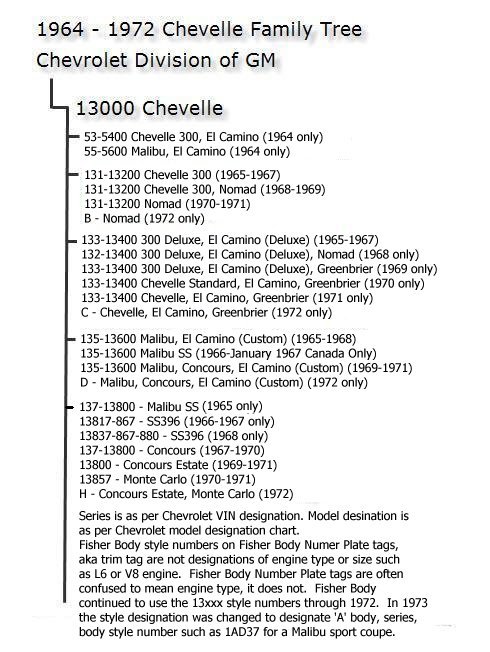
Say you saw it here on © ChevelleWorld
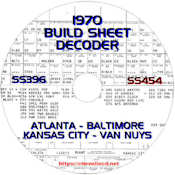
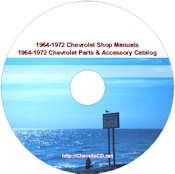
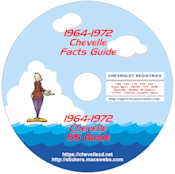
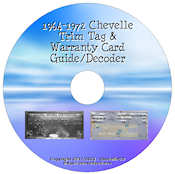
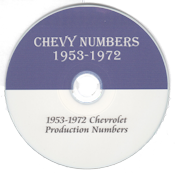
Want more in-depth information on 1964-1972 Chevelles? My 1970 SS 396/SS454
Build Sheet Decode Program CD, Shop Manuals & Parts Catalog program DVD, Facts and SS
Guide program CD, 1964-1972 Trim Tag and Protect-O-Plate program CD,
and my Chevy Numbers program CD. Check
them and other informative program CDs at my
https://chevellecd.net website.

 1964 Chevelle
1964 Chevelle 1965 Chevelle
1965 Chevelle 1966 Chevelle
1966 Chevelle 1967 Chevelle
1967 Chevelle 1968 Chevelle
1968 Chevelle 1969 Chevelle
1969 Chevelle 1970 Chevelle
1970 Chevelle 1971 Chevelle
1971 Chevelle 1972 Chevelle
1972 Chevelle


